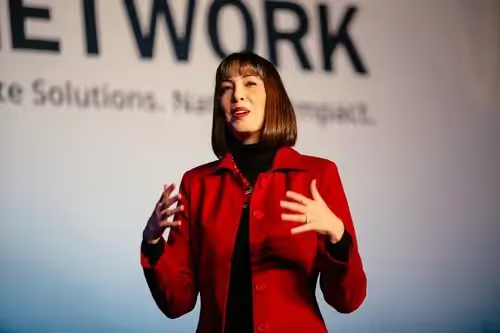
With each passing year, so many of us experience the accelerating force of change without the tools to greet it with grace & enthusiasm. Instead, leaders are often left feeling unprepared to navigate the transitions. Since we at LOCAL believe that change doesn’t have to be synonymous with suffering, we decided to chat with Meredith Turney, a conscious leadership coach, consultant, and communicator.

Meredith helps leaders and their teams create new ways of working and relating so they can prepare for the future by consciously co-creating it. She helps inject humanity back into leadership beyond the daily grind, which is so crucial to personal and professional growth, and company growth and sustainability. LOCAL President Neil Bedwell asked Meredith a few questions around conscious leadership and her insights are a must read.
Let’s start by defining the opposite of conscious leadership. Most of us have experienced or witnessed “leadership” that, instead of inspiring and encouraging us, leveraged fear to accomplish results. This kind of leadership may have been effective, but the impact it has on the leader and those following them can have long term negative costs. An “ends-justify-the-means” mentality won’t help us build a more prosperous, healthy world for all, and it demoralizes and eventually destroys teams.
Conscious leadership is both an inward and outward development process for each of us. We must first become aware of who we truly are, what we’re here to accomplish, and the impact we’re having on those around us. By focusing on inner growth and raising our level of consciousness, we can literally change the world. The famous saying adapted from a Mahatma Ghandi quote captures this evolution perfectly: “Be the change you wish to see in the world.” It starts on the individual level and radiates out from there.
Conscious leadership also means thinking holistically about everything in life and business. What is the highest and best good for all that can result from our work? That means breaking out of old programs and ways of being and rejecting the notions that we must conform to antiquated standards because “this is the way it is.”
It’s about becoming a person who is so attuned to their own truth and how they can have a positive impact in the world, it transforms them from the inside out and shifts the environment around them. Imagine if each of us did this kind of deep work. How would it revolutionize our relationships, the way we work, the way we govern?
A few years ago Mackey wrote Conscious Capitalism, which was the precursor to Conscious Leadership. In Conscious Capitalism, he described how capitalism raised more people out of poverty and provided more opportunity than any other system in history. But capitalism isn’t perfect. Mackey makes the case that capitalism can lead to greed and even abuse of the Earth’s resources. It requires conscious leadership to mitigate these challenges of an otherwise truly beneficial system.
Conscious Leadership builds on this message by sharing the essential attributes of a conscious leader. One of my most significant takeaways from Conscious Leadership is that conscious leaders connect people to purpose—and that begins with the leader first connecting to their own passion and purpose. As leaders continuously learn and grow, they can reinvest their expanding levels of consciousness back into their teams. It’s a virtuous cycle that creates exponential creativity, innovation, empathy, love, and impact. We truly can elevate humanity through business by investing in the holistic growth of our team members.
Change can be challenging—especially if the change is unexpected; we feel ill-equipped to navigate it, or it seems forced upon us by uncaring leaders. When I coach clients on developing their conscious leadership abilities, we talk a lot about their levels of listening and empathy. How well do they genuinely listen to their teams and how empathetic are they in understanding the impact of change?
The more we develop our ability to truly tune in to others and understand their experience, the better outcome for all. Change is inevitable and oftentimes necessary. How we lead others through it is what matters. Conscious leadership means developing those skills and finding the best outcome from a holistic perspective. Conscious leaders look for the win-win-win scenario in the midst of change.
Many of the clients I’ve worked with have developed their conscious leadership and had great success personally and professionally. Some were dealing with toxic or challenging work environments. They learned how to find their own truth, speak from a place of humble power, and make significant changes.
Oftentimes, they were even the manager who was contributing to the team dysfunction. Once they realized they had to take responsibility for their beliefs, emotions, and actions, we were able to increase their conscious leadership so that they showed up in a completely different way. The results are truly remarkable: renewed passion, broken relationships repaired, and teams working together towards a shared purpose.

Toxic workplaces are a direct reflection of the conscious leadership levels of the organization’s leadership. If the leaders are self-absorbed, or promote a win-at-all-costs mentality, they create a culture where toxicity thrives. To address this toxicity, each leader has to first examine their own motivations and contributions to the culture. Their beliefs, emotions, and actions foster the energy, or essence, of their team.
Once leadership begins shifting their internal beliefs and the resulting actions, the culture will naturally begin to shift around them because they will show up very differently. This approach requires self-responsibility, and the long term impact is a team that thrives through self-growth and contribution to the betterment of each employee.
A good place to start with ROI and conscious leadership is an anonymous employee assessment. Don’t just ask about job performance; ask about satisfaction and levels of happiness. Do the employees feel heard? Do they feel passionate about their work? These are baselines that can be measured against as leaders begin developing their conscious leadership skills.
If leaders are becoming more conscious leaders and investing in their teams’ holistic growth, assessments and traditional company performance measurements will reflect the shift in how leadership interacts with their team. You can make a profit while also investing in the wellbeing of your team. In fact, conscious leaders believe they are intrinsically intertwined.
The leaders I’ve worked with over the last year were dealing with something far more complicated than shifting their team to remote work; they were helping their team navigate a global pandemic crisis and all the physical and emotional turmoil that has entailed. This was crisis-mode transition. Most had never considered what remote work would look like for their team, let alone shepherded it through such a seismic cultural shift.
We first worked to ensure they, as a person, were able to process all the changes and step into their conscious leadership role. In 2020, the term “Chief Wellbeing Officer” was cited as the new role for many CEOs, and that definitely incorporates conscious leadership qualities.
These leaders then shifted towards giving back to their teams. Were they showing empathy? Were they listening? Were they providing the resources their teams needed to not just survive, but thrive? Once these foundations were set, they could then look at the long term goals for fostering a powerful remote team.
The year 2020 was a watershed year for how we work and relate to each other. Things will never return to the way they were. That’s actually exciting for conscious leaders because they have learned to be resilient, welcome change, and look for opportunity in every challenge.
When it comes to developing conscious leadership, oftentimes there isn’t a dramatic overnight transformation like Ebenezer Scrooge. It’s subtle changes that are cumulative. While there can be huge growth spurts based on immediate challenges, it’s the day-to-day habits and ways of being that can have a significant long term impact on the leader and their team.
Anyone can start on this journey. And it’s something they will work on for the rest of their career and life because there is no final destination. It’s the journey of becoming a person and leader who is completely in touch with their inner wisdom and knows how to bring out greatness in others to maximize benefits exponentially.